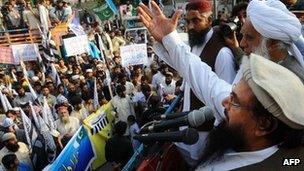US puts $10m bounty on Lashkar-e-Taiba's Hafiz Saeed
- Published

Hafiz Saeed was held after the Mumbai attacks but released without charge
The US has offered a $10m (£6.2m) bounty for Hafiz Mohammad Saeed, the founder of Pakistan-based militant group Lashkar-e-Taiba [LeT].
Mr Saeed now heads the Jamaat-ud-Dawa (JuD) group, widely seen as a front for LeT - which is blamed for the 2008 Mumbai attacks in India.
In a statement, JuD described the US move as "yet another attack on Islam and Muslims".
Both JuD and Lashkar-e-Taiba are blacklisted by the US.
The BBC's Tulip Mazumdar in Islamabad says that despite being on a national "watch-list" in Pakistan, Mr Saeed moves around the country relatively freely.
The US announcement puts Mr Saeed on a par with the Afghan Taliban leader Mullah Omar when it comes to "most wanted terrorists", our correspondent adds.
Mr Saeed was in Islamabad last week protesting outside parliament - calling for Pakistan to cut all ties with both the US and India. On Tuesday he spoke by telephone on a television chat show.
He has consistently denied any suggestion that either he or JuD - which he says is a charity - have played any role in militant violence.
The Pakistani government has not commented on the US announcement, but it has long argued that it cannot take action against him unless police or the courts formally instigate proceedings.
Pakistan arrested Lashkar-e-Taiba's senior leaders after the Mumbai attacks. But most of them, including Mr Saeed, were later freed on appeal.
The US has also offered a $2m bounty for Abdul Rehman Makki, Mr Saeed's brother-in-law and co-founder of Lashkar.
The three-day rampage by 10 gunmen in Mumbai in November 2008 left 165 people dead. Nine of the attackers were also killed.
India blamed the Mumbai attacks on LeT, and India-Pakistan ties hit rock bottom.
The sole surviving gunman, Pakistani national Mohammad Ajmal Amir Qasab, was captured and sentenced to death by a court. His appeal is pending.
'Most wanted'
Mr Saeed figures prominently on a list of "most wanted" given to Pakistan by India.
The US State Department's Rewards for Justice website describes Mr Saeed as "a Pakistani citizen" with "red hair" and "brown eyes".
"Hafiz Mohammad Saeed is a former professor of Arabic and engineering, as well as the founding member of Jamaat-ud-Dawa, a radical Deobandi Islamist organisation dedicated to installing Islamist rule over parts of India and Pakistan, and its military branch, Lashkar-e-Taiba," the website says.
India welcomed the reward, saying it sent a strong signal to LeT members that "the international community remains united in combating terrorism" and bringing to justice those behind the Mumbai attacks.
But the JuD statement said that it will only serve to add to anti-American sentiments among Muslims.
JuD spokesman Yahya Mujahid said the Americans had "done this in panic" because the JuD is running public campaigns against US drone attacks in Pakistan and against the Pakistani government's plans for reopening Nato supply routes to Afghanistan.
The supply routes were closed down in November when 24 Pakistani soldiers on the border with Afghanistan were accidentally killed in a US air strike.
Mr Mujahid said that JuD was also being targeted because of its opposition to Pakistani plans to grant trade concessions to India.
"The Americans are being influenced by Indian propaganda," Mr Mujahid said.
Interpol has issued an arrest notice against Mr Saeed for his role in the Mumbai attacks and the US has designated LeT and JuD as "Foreign Terrorist Organisations".
Cables released by Wikileaks in December 2010, attributed to US Secretary of State Hillary Clinton, said Hafiz Saeed and Zaki-ur-Rehman Lakhvi, head of Lashkar-e-Taiba, "continue to run" LeT "despite being detained for their role" in the Mumbai attacks.
The message alleged that Mr Lakhvi and Mr Saeed "planned, directed and executed" the group's attacks in South Asia.
- Published20 February 2012
- Published6 December 2010
- Published16 June 2010